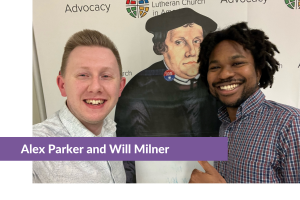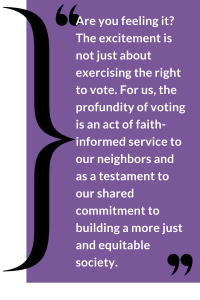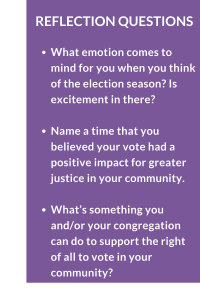In advance of Super Tuesday, William Milner, ELCA Hunger Advocacy Fellow, and Alex Parker, ELCA Advocacy Coordinator, with the D.C.-based staff shared election engagement reflections.
By William Milner and Alex Parker
 You could say we’re election nerds. We’ve woken up early, gone to the polling booth to cast our votes before school and work, and afterwards, rapidly dashed home to turn on the news and watch the results pour in. One of us even remembers in middle school printing out a map of the United States so he could write in each state’s electoral college numbers and color them in either red or blue to help him predict the night’s outcome!
You could say we’re election nerds. We’ve woken up early, gone to the polling booth to cast our votes before school and work, and afterwards, rapidly dashed home to turn on the news and watch the results pour in. One of us even remembers in middle school printing out a map of the United States so he could write in each state’s electoral college numbers and color them in either red or blue to help him predict the night’s outcome!
This Mar. 5, known as Super Tuesday, millions of people across 16 states (and one territory) hold their primary elections for the 2024 election. Are you feeling it? The excitement is not just about exercising the right to vote. For us, the profundity of voting is an act of faith-informed service to our neighbors and as a testament to our shared commitment to building a more just and equitable society.
Election engagement is not important to us simply because of our personal affinities, or because it is our job as federal advocates. By participating in the electoral process, we fulfill our duty as stewards of democracy and advocates for justice. Our votes are not only a reflection of our personal preferences but also a means to advocate for the common good and ensure that everyone’s voice is heard in the corridors of power. As faithful advocates, we are called not only to vote, but to vote in a way that aligns with the principles of love, justice and solidarity.
“Over time Lutherans have learned that energetic civic engagement is part of their baptismal vocation, both as individuals and through the church’s corporate witness. Such civic participation is not simply voluntary, idealistic, or altruistic. The ELCA holds to the biblical idea that God calls God’s people to be active citizens and to ensure that everyone benefits from the good of government (Jeremiah 29:7, Romans 13:1-7),” reads the ELCA social message “Government and Civic Engagement in the United States: Discipleship in a Democracy” (p. 14). Many resources for faith-based election engagement are available at ELCA.org/civicengagement and ELCA.org/votes, including a new “Intergenerational Conversation Starter,” encouraging story-sharing of what civic engagement looks like for each of us informed by our faith.
 Supporting full participation for all is another way faith informs our election engagement commitment. The John R. Lewis Voting Rights Advancement Act was reintroduced this past week in commemoration of the 59th anniversary of Bloody Sunday, where activists were beaten while marching for their civil rights across the Edmund Pettus Bridge in Selma, Ala. Advancement of this legislation, and others like The Freedom to Vote Act, are being monitored by ELCA advocacy staff. As the ELCA social statement Freed in Christ: Race, Ethnicity, and Culture says ” This church will support legislation, ordinances, and resolutions that guarantee to all persons equally: civil rights, including full protection of the law and redress under the law of discriminatory practices; and to all citizens, the right to vote” (p. 7).
Supporting full participation for all is another way faith informs our election engagement commitment. The John R. Lewis Voting Rights Advancement Act was reintroduced this past week in commemoration of the 59th anniversary of Bloody Sunday, where activists were beaten while marching for their civil rights across the Edmund Pettus Bridge in Selma, Ala. Advancement of this legislation, and others like The Freedom to Vote Act, are being monitored by ELCA advocacy staff. As the ELCA social statement Freed in Christ: Race, Ethnicity, and Culture says ” This church will support legislation, ordinances, and resolutions that guarantee to all persons equally: civil rights, including full protection of the law and redress under the law of discriminatory practices; and to all citizens, the right to vote” (p. 7).
Have you caught the excitement? As faith-based advocates for justice and stewards of democracy, we see our engagement in the electoral process as not merely a personal choice or professional obligation but a sacred calling. If you’re a Super Tuesday voter or will vote another time, don’t skip the opportunity. We embark on this electoral journey, mindful of the positive impact casting your ballot can have, taking part in our shared commitment to building a more just and equitable society.
